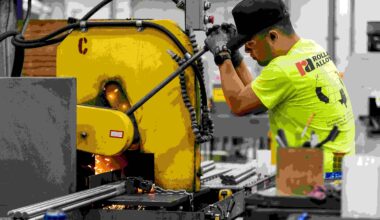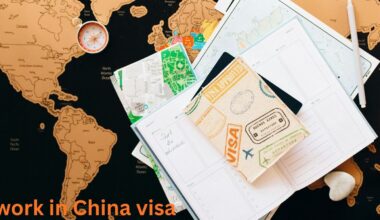Interested in getting overseas jobs with no experience? Here is the best guide to follow.
When most people hear the phrase working abroad, their minds instantly picture someone with a polished CV, years of corporate experience, or a degree from a big university.
Many young Nigerians and Africans in general disqualify themselves before they even try, simply because they believe overseas jobs with no experience is not possible.
But here’s the truth, your lack of experience may not be the barrier you are thinking about, it could be your ticket to real opportunities abroad.
Across Europe, North America, the Middle East, and even parts of Asia, there’s a constant demand for workers in industries that keep their economies running, like hospitality, caregiving, agriculture, cleaning, construction, and warehouse support.
These are roles that don’t necessarily require degrees or years of office experience. What employers often look for isn’t what’s printed on your CV, but your attitude, willingness to learn, and readiness to adapt.
Take an instance, a restaurant in Canada struggling to find wait staff is not waiting for a Harvard graduate, they’re waiting for someone who can show up on time, smile at customers, and handle pressure.
A farm in Australia doesn’t need a five year experience farmer, it needs someone willing to wake up early, work hard, and follow instructions.
The myth that no experience means no chance abroad has discouraged many dreamers. But this post will guide you how to get overseas jobs with no experience.
It’s not always about what you’ve done, but about the potential you bring with you and doors are open wider than you imagine, your journey abroad can start from zero.
Why Countries Hire People with No Experience
One big question many people ask is why would a country hire me if I don’t have experience?” The answer is simple, because they need you more than you think.
In many developed nations, there’s a gap between the jobs available and the number of people willing to do them.
While locals often chase high-end corporate positions, industries like hospitality, caregiving, construction, cleaning, and agriculture are left understaffed. This is where opportunities open up for foreign workers, even those with little or no prior experience.
For example, in the UK, care homes constantly seek caregivers because the local workforce isn’t enough to meet the growing demand of an aging population.
In Canada and Australia, farms and warehouses are always on the lookout for workers during peak seasons.
Even in countries across the Middle East, hotels and restaurants depend heavily on foreign staff to keep their businesses running smoothly.
And the interesting part is that employers in these industries are not searching for perfect CVs, they’re searching for reliable people.
They value:
- Willingness to work hard over years of office experience.
- Adaptability over fancy certificates.
- Positive attitude over technical jargon.
A warehouse in Germany doesn’t need someone with ten years of logistics management, it needs someone ready to lift boxes, follow safety rules, and keep operations moving.
Similarly, a restaurant in Dubai doesn’t need a master’s degree holder, it needs someone who can serve customers with a smile.
This is why so many Nigerians and Africans have successfully relocated through these opportunities.
They understood a vital truth which is the global job market runs on both skill and service, and the service side doesn’t always demand experience, it demands effort.
So, when you see ads for overseas jobs with no experience required, it’s not a scam. It’s the reality of a labor market that needs fresh hands, open minds, and people ready to start from the ground up.
And that could be your entry point into a brand-new life abroad.
Understanding Your Strengths
When people say i have no experience, what they really mean is i have never worked in a formal office job. But the truth is, every single person has experience but not the type they have been taught to value.
The first step to landing an overseas job with no experience is learning to recognize your hidden strengths.
Take a moment to reflect, have you ever helped in your family’s shop? That’s customer service and sales. Do you know how to care for younger siblings or elderly relatives? That’s caregiving experience.
Have you played sports, volunteered at church, or led a small group activity? That’s teamwork and leadership in action.
Employers abroad are not only looking for degrees, they’re also searching for people with soft skills like
Communication
Can you interact with people politely and clearly?
Teamwork
Can you work with others without conflict?
Resilience
Can you stay strong when work gets tough?
Adaptability
Can you adjust to new cultures, schedules, and ways of doing things?
These qualities often matter more than a certificate on paper. For instance, a Nigerian who has spent years assisting in a small business may not think of it as an experience, but to a hotel manager abroad, it shows reliability, people skills, and responsibility.
Understanding your strengths also boosts your confidence. Many job seekers fail, not because they lack ability, but because they undervalue themselves.
When you can confidently say, I may not have worked in an international company, but I know how to handle people, follow instructions, and learn quickly, you’ve already positioned yourself as a strong candidate.
So, before you start searching for opportunities abroad, pause and take inventory of your life experiences.
Write down what you’ve done, no matter how small it seems, and identify the skills behind those actions. You’ll realize you’re not starting from zero, you’re starting from a foundation you’ve been building all along.
Pathways That Welcome Beginners
Once you’ve recognized your hidden strengths, the next big question becomes: where exactly can I start if I have no formal work experience?
The good news is that there are plenty of entry points abroad, industries that value dedication and a willingness to learn over years of professional history. These are the true pathways that welcome beginners.
Take the service industry, for example. Hotels, restaurants, and cleaning companies across Europe, the Middle East, and North America depend heavily on foreign staff.
A young Nigerian who has helped out in a family canteen may find themselves working as a kitchen assistant in Canada, gradually climbing the ladder to become a supervisor or even a head chef. Service jobs are about energy, communication, and consistency not a glowing CV.
Then there are seasonal and temporary roles. Countries like Australia and Canada open their doors during harvest seasons, looking for fruit pickers and farmhands.
These jobs are short-term, but they pay well and often provide accommodation. For someone just stepping into the overseas job market, this is a perfect way to gain international or overseas job with no experience prior to employment history.
Another growing field is support roles in caregiving and warehouse operations. With aging populations in places like the UK, the demand for caregivers is rising daily. While it may seem intimidating, much of the training is offered on the job.
Similarly, warehouses and logistics companies are constantly in search of people who can handle sorting, packaging, and inventory support. It’s honest work that builds both your income and your resume.
The beauty of these pathways is that they don’t trap you, they open doors. A hotel cleaner today can train to become a receptionist tomorrow.
A fruit picker can move into a permanent farm management role. A caregiver can advance into nursing with additional training. The entry job is not your destination; it’s the bridge.
So, instead of asking which glamorous job can I get abroad without experience? the better question should be which pathway can I step into today that will take me closer to my long-term dream?”
Every big career overseas starts with one small opportunity and those beginner-friendly pathways are waiting for you.
The Hidden Advantage of Starting Small Abroad
Many people shy away from overseas opportunities because the jobs they first see don’t look glamorous. Why should I travel across the world just to clean, serve food, or pick fruits?
But what they don’t realize is that these so-called small jobs often carry the biggest hidden advantage. They are stepping stones to something greater.
Starting small abroad is not a limitation, it’s an opportunity disguised in plain clothes. Unlike in many countries back home where growth can be slow and restricted, overseas job systems often reward consistency and dedication.
A kitchen assistant in a London restaurant who proves reliable and hardworking may soon be promoted to a supervisor, then a manager.
A caregiver in Canada can go on to earn certifications that lead to better pay, permanent residency, and even the chance to bring family members over.
What looks like just cleaning hotel rooms could be your ticket to learning the ropes of hospitality, networking with professionals, and later becoming a front desk officer, event manager, or even a business owner in the same field.
Every humble role in abroad carries hidden ladders you may not have seen.
The real magic is in what these entry level jobs give you beyond the paycheck.
Exposure to international work culture
You learn punctuality, professionalism, and discipline that stay with you forever.
Opportunities for training and growth
Many employers sponsor courses for their staff, helping you upgrade your skills.
Pathways to permanent residency :
In countries like Canada and Australia, even beginner jobs can qualify you for immigration programs if you stay consistent.
So, the question is not whether the job is small but whether you are willing to see the big picture.
Every successful immigrant story has one thing in common which is they started somewhere, often in roles no one back home would brag about. Yet those same jobs became the foundation for the life they dreamed of.
Remember that abroad, is not about where you start, but where the pathway leads you.
Preparing Yourself Before You Leave
Landing an overseas jobs with no experience doesn’t start the day you arrive at the airport, it starts long before you pack your bags.
Many Nigerians rush into opportunities abroad with excitement but little preparation, only to realize later that the journey requires more than just a passport.
If you want your move to be successful, preparation is your strongest weapon.
The first area to focus on is communication. English is widely used in many countries that welcome foreign workers, but fluency and confidence can set you apart.
Simple things like practicing polite greetings, customer service phrases, or workplace vocabulary can give you an edge during interviews and on the job.
Free resources like YouTube tutorials, podcasts, and language apps can help you sharpen these skills even before you leave.
Next is skill building. Don’t underestimate the power of basic online courses.
Platforms like Coursera, Alison, and even short training on YouTube offer free lessons in caregiving, hospitality, logistics, or customer service.
These small certificates or skills might not be mandatory, but they make you more attractive to employers and prove your commitment to learning.
Another crucial part of preparation is researching your destination. Each country has its own unique needs and systems.
Canada, for example, often offers seasonal farm jobs and caregiver pathways. The UK has a huge demand for healthcare assistants.
The Middle East looks for hotel and restaurant staff. Knowing where your strengths fit best helps you avoid scams and focus your energy on the right applications.
And of course, there’s financial and mental readiness. Moving abroad requires some starting capital for tickets, visas, and initial expenses.
The journey abroad is not just about the job, it’s about transformation. If you leave unprepared, you risk frustration. But if you prepare yourself through language, skills, research, finances, and mindset, you will not only survive, but will thrive.
So, before you step onto that plane, ask yourself have I prepared enough to succeed when I land?” If the answer is yes, then you’re already miles ahead of the crowd.
Overcoming the Fear of Starting from Zero
Perhaps the biggest obstacle holding many people back from pursuing overseas jobs with no experience isn’t the visa process or the financial cost but fear.
Fear of starting from scratch. Fear of leaving the familiar behind. Fear of being judged for doing small jobs abroad.
But the reality is that every success story you admire once started at zero. The nurse in the UK who now earns a stable income may have started as a healthcare assistant with no background in medicine.
The business owner in Canada who now employs others may have once worked long hours packing boxes in a warehouse. Starting from zero doesn’t mean failure, it means beginning a journey of growth.
The fear is natural. It whispers questions like:
- What if I fail?
- What will people say when they see me doing entry-level work?
- Am I really cut out for life abroad?
But the answer lies in shifting your perspective. Overseas small job is not a dead end, it’s a launchpad.
Every hour you work is an investment in your future. Every skill you pick up, every challenge you overcome, and every cultural lesson you learn builds you into someone stronger and more prepared for bigger opportunities.
It’s also important to remember that nobody abroad is watching or mocking you the way you imagine. In most developed countries, dignity of labor is respected.
A cleaner, a caregiver, or a waiter is seen as a hardworking professional contributing to society. And with consistency, those very roles can open doors to permanent residency, further studies, or career advancement.
The real question isn’t whether you’ll start from zero, it’s whether you are willing to take that first step. Fear loses its grip the moment you decide to act.
Conclusion
The dream of working abroad often feels out of reach for those without a polished CV or years of professional experience. But as you’ve seen, the truth is very different.
Opportunities exist for anyone bold enough to take the first step. From hospitality to caregiving, farms to warehouses, the world is full of entry points that don’t demand perfection, only commitment.
Yes you may start small, the beginning might feel humbling. But always remember that starting from zero is not a setback, it’s a foundation.
Each shift you work, each skill you gain, and each challenge you overcome becomes part of the story you will one day be proud to tell.
So, instead of waiting for the perfect time or fearing what others will say, start preparing now. Learn the skills you can, sharpen your confidence, research your pathways, and build the courage to step into the unknown.
So it is possible for someone to get overseas jobs with no experience. The only question left is if you are ready to turn that dream of working abroad into your reality?
Did you find this article on guide to get overseas jobs with no experience very helpful? Let us know in the comment section.
Similar Post






